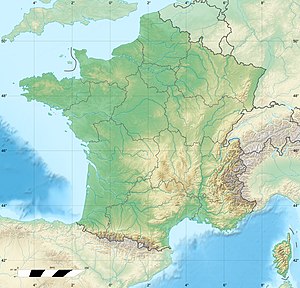
Back شەڕی ڕیمس (١٨١٤) CKB Gefecht bei Reims German Bataille de Reims (1814) French Reimsi csata Hungarian Battaglia di Reims (1814) Italian Slag bij Reims (1814) Dutch Bitwa pod Reims Polish Бой под Реймсом (1814) Russian 漢斯戰役 (1814年) Chinese
| Battle of Reims (1814) | |||||||
|---|---|---|---|---|---|---|---|
| Part of the Campaign of France of the Sixth Coalition | |||||||
 The Last Victory, by Maurice Orange | |||||||
| |||||||
| Belligerents | |||||||
|
|
| ||||||
| Commanders and leaders | |||||||
|
|
| ||||||
| Strength | |||||||
|
13 March: 8,000[1]–10,000 |
13 March: Russia: 7,800–9,000[1] Prussia: 4,000[1]–5,600 | ||||||
| Casualties and losses | |||||||
| 700[2][3] | 6,000–8,000 | ||||||
Location within France | |||||||
The Battle of Reims (12–13 March 1814) was fought at Reims, France between an Imperial French army commanded by Emperor Napoleon and a combined Russian-Prussian corps led by General Emmanuel de Saint-Priest. On the first day, Saint-Priest's Russians and General Friedrich Wilhelm von Jagow's Prussians easily captured Reims from its French National Guard garrison, capturing or killing more than half of its defenders. On the second day, an overconfident Saint-Priest carelessly deployed his forces west of the city, not grasping that Napoleon was approaching with 20,000 troops. Too late, Saint-Priest realized who he was fighting and tried to organize a retreat. In the battle that followed, the French army struck with crushing force and the Allies were routed with serious losses. During the fighting, Saint-Priest was struck by a howitzer shell and died two weeks later.
- ^ a b c d e Bodart 1908, p. 478.
- ^ Meeks 2019, p. 168.
- ^ Zabecki 2014, p. 1069.

